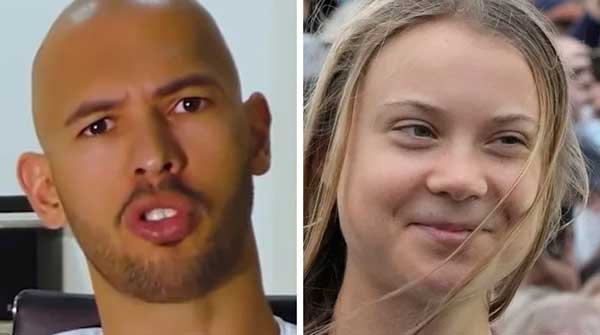Until Greta Thunberg tweeted about the size of his weewee, nothing was effective at stopping him
 Andrew Tate rose to great prominence among young people in 2022. He was banned on several social media platforms but maintained a strong following, especially with boys and young men. In what many consider the best good news story to end the year, he was publicly humiliated by environmentalist Greta Thunberg and subsequently arrested for human trafficking.
Andrew Tate rose to great prominence among young people in 2022. He was banned on several social media platforms but maintained a strong following, especially with boys and young men. In what many consider the best good news story to end the year, he was publicly humiliated by environmentalist Greta Thunberg and subsequently arrested for human trafficking.
Many had tried to “cancel” Tate, but until Thunberg tweeted about the size of his weewee, nothing was effective.
Tate’s greatest strength had been his ability to manipulate the popular media for his own gain. To counter the message of Andrew Tate, and to keep him and others like him from again rising to prominence, we need to understand their greatest weaknesses: who they are and what they preach.
 |
| Related content |
| Extinction Rebellion’s cult-like threat to society
|
| Thunberg has world leaders in the palm of her hand
|
| Why we should ignore teen advice on policy issues
|
Andrew Tate came to fame as a kickboxer. When one listens to him speak, it is clear that his perception of life is that of a champion fighter. One must set goals and deal with diversity, one must train and be accountable, and if one has talent and works hard, one will have success.
That is really all that there is to Andrew Tate. Life is kickboxing; it is being a winner or a loser. One cannot show vulnerability or weakness if one is going to win.
Despite his limited worldview, Andrew Tate has said many things on many topics. Even a broken clock is right twice a day, but much of what Tate says is untrue and extremely dangerous. Because he has been banned on so many platforms, however, I was thankfully unable to find the worst examples of his offensive rants.
In an interview with British talk show host Piers Morgan, he explained that he would deal with crime in London by building a prison in the Qatari desert and sentencing people to 25 years in jail for relatively minor crimes. Inmates would be fed once a day while they wallowed in the scorching heat, and he would then publicly broadcast their suffering to deter other would-be “criminals.”
Some leaders have adopted similar practices regarding crime; few of us would want to live under those regimes. Quite interestingly, statistics demonstrate that countries with the most humane prisons tend to have the lowest crime rates, as do countries with the most effective social programs.
In light of Tate’s recent arrest, one wonders if his views on crime and punishment will change.
Tate also preaches that a father should largely be absent from the lives of his children and leave most of the parenting work to women. I cannot think of more tragic and childish behaviour in a man. From experience, I can state that being a dad is one of life’s greatest privileges and responsibilities. Having been largely abandoned to the care of his mother in childhood, however, Tate’s perspective could be an effort to legitimize his own father’s actions.
Though we cannot do a psychological analysis of Andrew Tate, we can observe his words and deeds. They are quite consistent with that of other traumatized individuals. Tate is verbally aggressive toward men who demonstrate vulnerability, so it is not a stretch to assume that he is terrified of having his own vulnerabilities exposed.
In fact, this is precisely what led to his demise. His video rebuttal to Thunberg’s tweet alerted police to his location, resulting in his arrest.
Corporate media thrives on negativity and extreme behaviour, allowing people like Andrew Tate to rise to prominence. This is unlikely to change. The challenge for the rest of us, therefore, is to educate ourselves and our children to understand the characteristics of principled leadership and thus distinguish it from authoritarianism, foolishness, and inevitable destruction.
We need to learn to see through the words of Andrew Tate and others like him, as Greta Thunberg did. They cannot have a negative impact on our society if we learn to recognize and point out their ineptitude.
Gerry Chidiac specializes in languages, genocide studies and works with at-risk students. He is the recipient of an award from the Vancouver Holocaust Education Centre for excellence in teaching about the Holocaust.
For interview requests, click here.
The opinions expressed by our columnists and contributors are theirs alone and do not inherently or expressly reflect the views of our publication.
© Troy Media
Troy Media is an editorial content provider to media outlets and its own hosted community news outlets across Canada.

